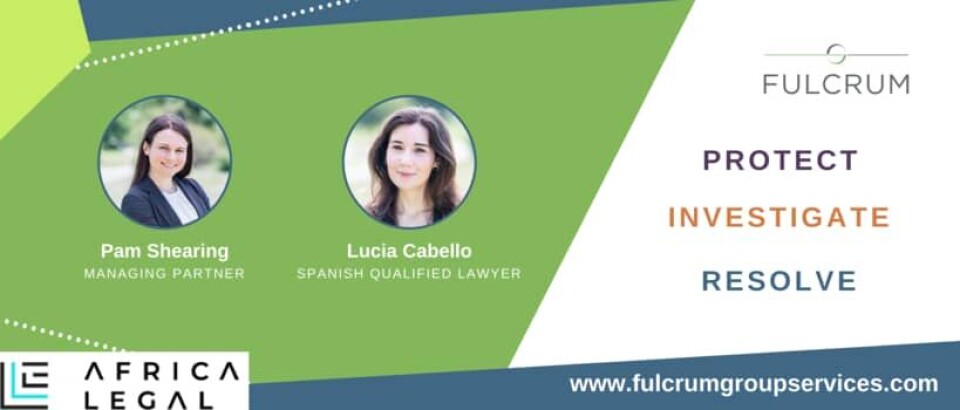Copyright : Re-publication of this article is authorised only in the following circumstances; the writer and Africa Legal are both recognised as the author and the website address www.africa-legal.com and original article link are back linked. Re-publication without both must be preauthorised by contacting editor@africa-legal.com
ESG: The Challenges for Organisations

In recent years, stakeholders have increasingly scrutinised the environmental and social impact of organisations’ decisions. The pandemic has only accelerated this discussion, with social movements highlighting matters such as gender equality, diversity, and the health and safety of employees in the workplace.
In this article, Managing Partner Pam Shearing of the London-based consultancy Fulcrum, and Spanish Qualified Lawyer Lucia Cabello, discuss how focusing on environmental and social issues is no longer an activity reserved for lobbyists and campaigners alone. Environmental, social and governance (ESG) concerns now occupy the attention of governments, regulators, investors, the media, and the general public alike, as is evident by the growing body of legislation, regulations, and activism being seen worldwide.
This begs a number of questions: What role do businesses have in the ESG discussion? How are they likely to be affected? What can lawyers do to stay ahead of the intensifying spotlight on ESG?
How can companies respond to new challenges in the ESG field?
- Conduct an ESG risk assessment
Enhanced legal and regulatory requirements (in particular, those tending to the harmonisation of ESG disclosure obligations and reporting requirements) stress the importance of conducting a thorough risk assessment.
This will enable organisations to: (i) identify ESG related risks (for example, concerns relating to sustainability, working conditions or human rights); (ii) assess the severity of those risks; and (iii) prioritise the response to those which are most likely to affect an organisation’s activities.
It will be necessary to ensure that the risk and compliance functions are suitably equipped with the right skill set and knowledge to manage ESG related risks in the event they are unearthed. As a result, it will be necessary to review and adapt internal policies, procedures and training resources.
- Ensure that appropriate ESG due diligence is undertaken
In light of (i) heightened environmental and social awareness; (ii) increasing scrutiny from investors and the general public; as well as (iii) the direction of new ESG regulations calling for greater transparency and accountability, organisations must integrate ESG within their due diligence policies and procedures.
Ongoing due diligence is essential to safeguard the sustainability of the supply chain. In addition, it should be introduced as a standard part of the screening process before entering into contracts with third parties and business partners. Due diligence can thus play a key role in mitigating any potential reputational risks of doing business with parties whose corporate values and operations do not align with your own.
- Develop ESG policies and procedures and integrate ESG into decision-making processes
Given the heightened scrutiny into corporate behaviour, having robust governance practices should be a top priority for businesses today. It is vital that senior management leads by example, establishing a clear tone from the top, promoting transparency, gender equality and diversity across the Board, as well as at all levels of an organisation. By embracing ESG-related principles as a key element of the decision-making process, ESG will be placed at the centre of business activities and will be most likely to take root more broadly.
- Promote a healthy corporate culture
A robust corporate culture will be the main driving force in helping to guide an organisation and its employees to act responsibly and in an ethical and sustainable manner – principles that are at the heart of ESG.
To establish a robust corporate culture, organisations must coordinate their efforts to create a clear tone from the top which cascades down through all levels of business operations. This will need to be matched with appropriate and dedicated training to raise awareness of ESG – and the firm’s specific approach to it – among employees. Enhancing familiarity around the concept of ESG and affirming the organisations’ commitment to it is one priority; another is promoting a “speak up culture” so that individuals feel confident in raising ESG related concerns, as well as implementing ESG practices within their own everyday operations.
- Training and communication
A robust corporate culture that promotes ESG as a fundamental part of business operations will need to be supported by internal communications, appropriate messaging and relevant training, all tailored to the key ESG issues encountered by an organisation. This includes its risk profile, its geographical and sectoral reach, and the changing regulatory landscape.
Training must be continuous, regularly monitored, evaluated and adapted, not only to a changing ESG framework but also specific to the audience and the different roles and specific tasks undertaken by individuals within an organisation.
The importance of communications should not be underestimated, as communication will be an enabler to embed ESG principles within the organisation, and ensure that these values are lived and breathed across the organisation’s operations.
Conclusion
As we have seen to date, the ESG impact of business decisions is being monitored very closely by investors, shareholders, employees, competitors, and regulators alike.
In light of the heightened scrutiny over corporate behaviour, organisations need to ensure that they are responsive, and aware of the financial and reputational impacts that may result from a failure to engage adequately with ESG considerations.
To join Africa Legal's mailing list please click here
